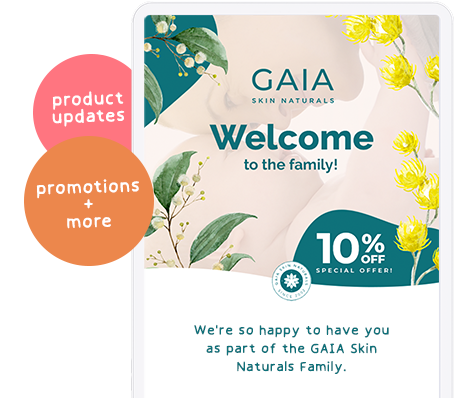There’s been an explosion of information around the link between the mouth and gut. Science has shown that there all sorts of ways, the well-being of the mouth can influence overall health and reduce the risk of a range of chronic diseases. Most of the benefits relate to adults, however, babies and young children also affected when their oral health is not ideal and there is an overgrowth of ‘unhealthy’, versus ‘healthy’, microorganisms.
It's generally believed that babies are born with sterile saliva and it’s not until bacteria are transmitted, most commonly from a mother to her baby, that this changes. Tooth decay is caused by bacteria, Streptococcus Mutans and sharing food from the same cutlery, blowing on food to cool it and kissing a baby on the mouth are all ways in which this bacteria is transmitted. Even before a baby has any teeth, they can be affected by Streptococcus Mutans.
Currently in Australia, tooth decay is the leading chronic disease of childhood, though in many cases, it can be avoided.
Your dental hygiene
How you care for your own mouth will have a direct effect on your baby’s oral health. If you have active decay, your baby will be at greater risk of developing it too.
- See your dentist regularly, ideally every six months. Regular dental checks, expert cleaning and fluoride treatments all reduce the risk of tooth decay.
- If you’re pregnant, see your dentist at least once during your pregnancy. Gum disease increases the risk of premature labour. When the gums are inflamed, they produce prostaglandins which can be transmitted to the uterus and the baby.
- Brush your teeth at least twice each day with fluoridated toothpaste and floss daily. Toothbrushing alone does not clean in-between the teeth, which is where decay often happens. Keep floss in your bathroom, desk drawer, in your handbag and in the car.
- Bleeding gums are a sign that brushing and flossing needs to be done more often. And that it’s time to see a dentist.
- Avoid kissing your baby on the mouth, blowing on their food to cool it, putting their dummy or teat in your own mouth and then offering it to your baby.
- Encourage all family members to be conscious of not sharing their saliva with your baby. Even grandparents can pass on saliva which is contaminated with decay causing bacteria.
- Role model tooth brushing and flossing to your child. If they see you caring well for your teeth, they will learn how to do the same.
- Watch your diet and try to avoid snacking and sweet treats.
12 ways to care for your baby’s teeth
Even before your baby has any teeth, clean their gums daily with a clean, damp, soft washer or piece of gauze. This will help them to get used to having their mouth cleaned.
- Once your baby has teeth, use a soft, small headed toothbrush to clean their teeth. The most important time to brush is before they go to sleep at night – this is when saliva flow slows down.
- Always brush your child’s teeth yourself, but let them have a practice when you’re finished. Children don’t have the manual dexterity to do a thorough job of cleaning their own teeth until they’re around 8 or 9 years old. Until then, always brush their teeth yourself.
- As soon as your child has two teeth close together, floss in-between them. If it’s too hard to use floss, try using interdental brushes or small ‘harp’ shaped flossettes to access these small spaces.
- Use water only on the toothbrush, not toothpaste until they’re 6 months of age. Then start using a children’s toothpaste, pea-sized amount is ideal. Keep using children’s toothpaste until they’re 6 years old, or the age your dentist recommends.
- You may choose to use a children’s toothpaste which does not contain fluoride. Some parents are concerned about the risks of fluorosis –white/speckled patches from too much fluoride when the adult teeth are forming. The way to avoid this is to use a very small amount of toothpaste and encourage your child not to swallow, but to spit out whatever toothpaste is in their mouth after brushing.
- Change your child’s toothbrush every few months or when it’s looking worn. Also replace their toothbrush when they’ve recovered from being sick. Microorganisms can multiply on wet bristles.
- Never share your own toothbrush with your baby’s. This is a more common practice than many of us realise.
- Take your baby for their fist dental check when their first tooth erupts, or when they turn one. What’s valuable is the monitoring of teeth and oral health over time, so early changes can be detected and treated early.
- Offer your baby plain water to drink in-between their meals. Sweet juices, cordials and even milk all contain sugar which leads to tooth decay. Avoid offering your baby frequent snacks which also increases the risk of decay.
- Avoid using teething necklaces – there is no evidence to support the claims that they relieve teething discomfort. However, teething rings, foods with texture and chewable toys can all offer some relief. Speak with your pharmacist about analgesia which may occasionally be needed.
- If your baby is bottle feeding, aim to stop all bottles by the time they turn one year of age. Milk contains lactose, a form of milk sugar which can lead to bottle caries developing.
- Get into the habit of lifting your baby/child’s top lip every couple of months. Look for early signs of decay which cause white, chalky lines, brown patches and gum swelling to appear. Take your child to the dentist if you see any changes.
Written for GAIA by Jane Barry, Midwife and Child Health Nurse, May 2022.



